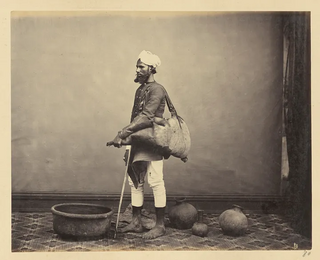
Joseph Rudyard Kipling was an English novelist, short-story writer, poet, and journalist. He was born in British India, which inspired much of his work.
This is a bibliography of works by Rudyard Kipling, including books, short stories, poems, and collections of his works.

Kim is a novel by Nobel Prize-winning English author Rudyard Kipling. It was first published serially in McClure's Magazine from December 1900 to October 1901 as well as in Cassell's Magazine from January to November 1901, and first published in book form by Macmillan & Co. Ltd in October 1901. The novel is notable for its detailed portrait of the people, culture, and varied religions of India. "The book presents a vivid picture of India, its teeming populations, religions, and superstitions, and the life of the bazaars and the road." The story unfolds against the backdrop of the Great Game, the political conflict between Russia and Britain in Central Asia. The novel popularized the phrase and idea of the Great Game.
"Gunga Din" is an 1890 poem by Rudyard Kipling set in British India. The poem was published alongside "Mandalay" and "Danny Deever" in the collection "Barrack-Room Ballads".

The Barrack-Room Ballads are a series of songs and poems by Rudyard Kipling, dealing with the late-Victorian British Army and mostly written in a vernacular dialect. The series contains some of Kipling's best-known works, including the poems "Gunga Din", "Tommy", "Mandalay", and "Danny Deever", helping consolidate his early fame as a poet.

The Bhishti or Bahishti are a Muslim tribe or biradari found in North India, Pakistan and Nepal. They are also known as Abbasi, Bahishti Abbasi, Sheikh Abbasi and Saqqa. They often use the surnames Abbasi or Sheikh Abbasi. The Sheikh Abbasi belongs to the Arab tribe Banu Abbas. Bhistis traditionally served as water-carriers in the military.

"Danny Deever" is an 1890 poem by Rudyard Kipling, one of the first of the Barrack-Room Ballads. It received wide critical and popular acclaim, and is often regarded as one of the most significant pieces of Kipling's early verse. The poem, a ballad, describes the execution of a British soldier in India for murder. His execution is viewed by his regiment, paraded to watch it, and the poem is composed of the comments they exchange as they see him hanged.

The Pioneer is an English-language daily newspaper in India. It is published from multiple locations in India, including Delhi. It is the second oldest English-language newspaper in India still in circulation after The Times of India. In 2010, The Pioneer launched its Hindi version in Lucknow.

Gunga Din is a 1939 American adventure film from RKO Radio Pictures directed by George Stevens and starring Cary Grant, Victor McLaglen, and Douglas Fairbanks Jr., loosely based on the 1890 poem of the same name by Rudyard Kipling combined with elements of his 1888 short story collection Soldiers Three. The film is about three British sergeants and Gunga Din, their native bhisti, who fight the Thuggee, an Indian murder cult, in colonial British India.

Plain Tales from the Hills is the first collection of short stories by Rudyard Kipling. Out of its 40 stories, "eight-and-twenty", according to Kipling's Preface, were initially published in the Civil and Military Gazette in Lahore, Punjab, British India between November 1886 and June 1887. "The remaining tales are, more or less, new."

"Mandalay" is a poem by Rudyard Kipling, written and published in 1890, and first collected in Barrack-Room Ballads, and Other Verses in 1892. The poem is set in colonial Burma, then part of British India. The protagonist is a Cockney working-class soldier, back in grey, restrictive London, recalling the time he felt free and had a Burmese girlfriend, now unattainably far away.

The Leicestershire Regiment was a line infantry regiment of the British Army, with a history going back to 1688. The regiment saw service for three centuries, in numerous wars and conflicts such as both World War I and World War II, before being amalgamated, in September 1964, with the 1st East Anglian Regiment, the 2nd East Anglian Regiment and the 3rd East Anglian Regiment to form the present day Royal Anglian Regiment, of which B Company of the 2nd Battalion continues the lineage of the Royal Leicestershire Regiment.
In the British Army, a gentleman ranker is an enlisted soldier suited through education and social background to be a commissioned officer or indeed a former commissioned officer. Rudyard Kipling titled one of his poems, which was published in 1892, "Gentlemen-Rankers".
"The Three Musketeers" is a short story by Rudyard Kipling which introduces three fictional British soldiers serving in India in the later nineteenth century: the privates Learoyd, Mulvaney and Ortheris. These characters appear in many early Kipling stories. "The Three Musketeers" was first published in the Civil and Military Gazette on 11 March 1887. It appeared in book form in Plain Tales from the Hills (1888).
Rudyard Kipling introduces, in the story The Three Musketeers (1888) three characters who were to reappear in many stories, and to give their name to his next collection Soldiers Three. Their characters are given in the sentence that follows: "Collectively, I think, but am not certain, they are the worst men in the regiment so far as genial blackguardism goes"—that is, they are trouble to authority, and always on the lookout for petty gain; but Kipling is at pains never to suggest that they are evil or immoral. They are representative of the admiration he has for the British Army—which he never sought to idealise as in any way perfect—as in the poems collected in Barrack-Room Ballads (1892), and also show his interest in, and respect for the "uneducated" classes. Kipling had great respect for the independence of mind, initiative and common sense of the three—and their cunning.
Derbyshire County Cricket Club in 1919 was the first cricket season after a four-year break from first class cricket during World War I. The English club Derbyshire had been playing for forty-eight years with their twenty first season in the County Championship being notable that they won three matches in the County Championship to come ninth.

Under the Deodars is a collection of short stories by Rudyard Kipling.

John Kipling was the only son of British author Rudyard Kipling. In the First World War, his father used his influence to get him a commission in the British Army despite being decisively rejected for poor eyesight. His death at the Battle of Loos caused his family immense grief.
A Choice of Kipling's Verse, made by T. S. Eliot, with an essay on Rudyard Kipling is a book first published in December 1941. It is in two parts. The first part is an essay by American-born British poet T. S. Eliot (1888–1965), in which he discusses the nature and stature of British poet Rudyard Kipling (1865–1936). The second part consists of Eliot's selection from Kipling's poems.
Gerard Francis Cobb was Junior Bursar of Trinity College, Cambridge. He was active as an Anglican layman, organist and amateur composer.












